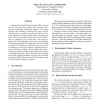Free Online Productivity Tools
i2Speak
i2Symbol
i2OCR
iTex2Img
iWeb2Print
iWeb2Shot
i2Type
iPdf2Split
iPdf2Merge
i2Bopomofo
i2Arabic
i2Style
i2Image
i2PDF
iLatex2Rtf
Sci2ools
104
click to vote
CEC
2003
IEEE
2003
IEEE
Learning DFA: evolution versus evidence driven state merging
Learning Deterministic Finite Automata (DFA) is a hard task that has been much studied within machine learning and evolutionary computation research. This paper presents a new method for evolving DFAs, where only the transition matrix is evolved, and the state labels are chosen to optimize the fit between final states and training set labels. This new procedure reduces the size and in particular, the complexity, of the search space. We present results on the Tomita languages, and also on a set of random DFA induction problems of varying target size and training set density. The Tomita set results show that we can learn the languages with far fewer fitness evaluations than previous evolutionary methods. On the random DFA task we compare our method with the Evidence Driven State Merging (EDSM) algorithm, which is one of the most powerful known DFA learning algorithms. We show that our method outperforms EDSM when the target DFA is small (less than 32 states) and the training set is s...
| Added | 04 Jul 2010 |
| Updated | 04 Jul 2010 |
| Type | Conference |
| Year | 2003 |
| Where | CEC |
| Authors | Simon M. Lucas, T. Jeff Reynolds |
Comments (0)

